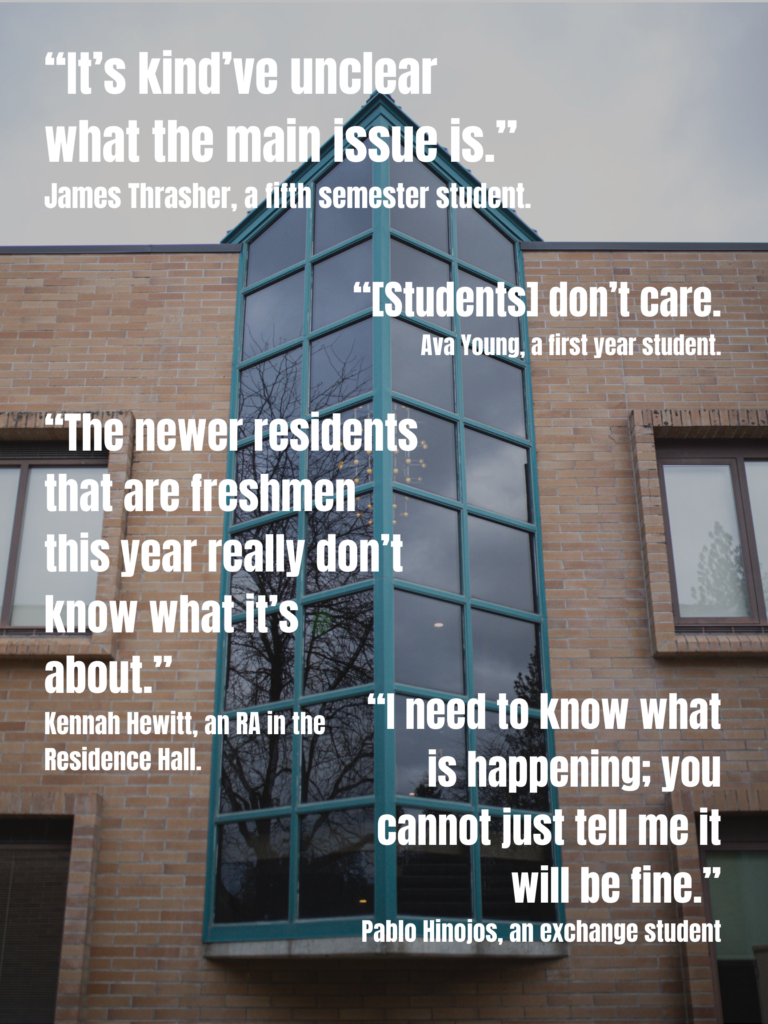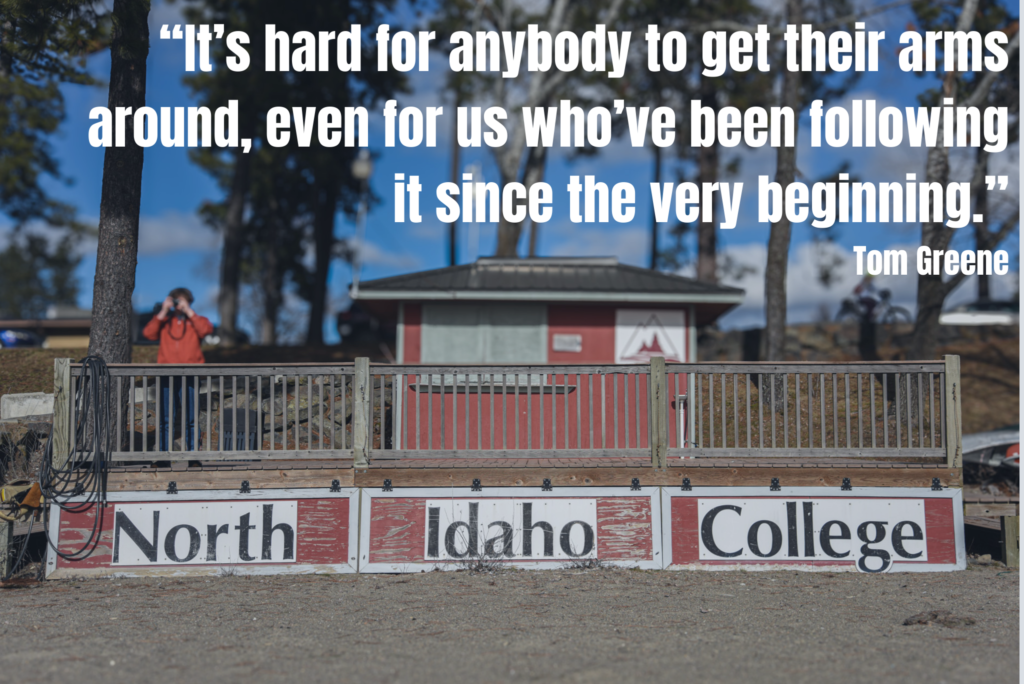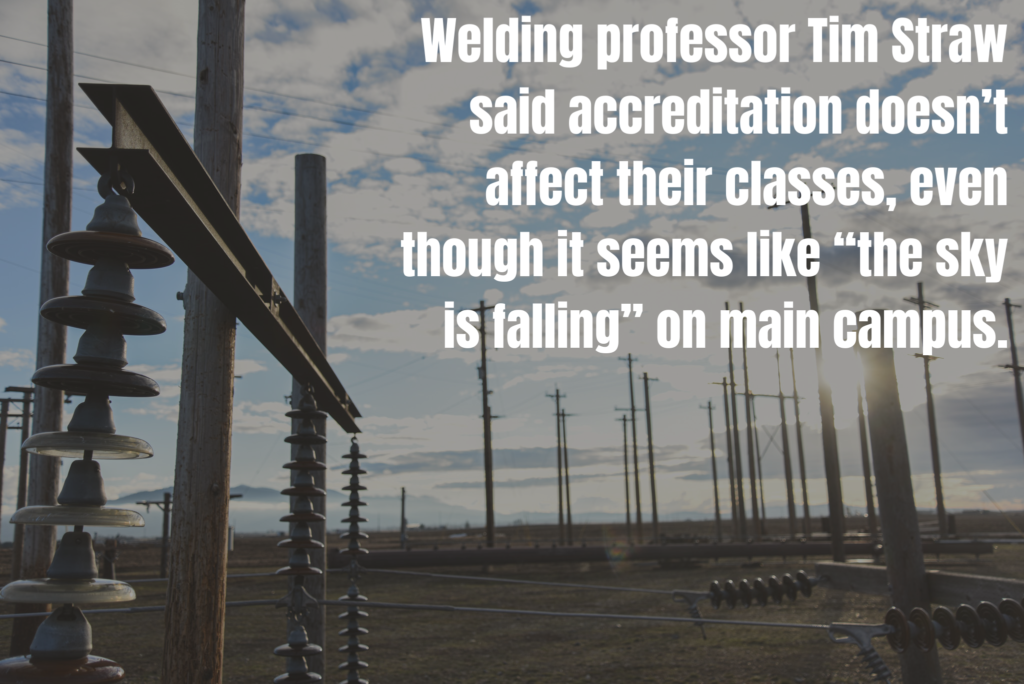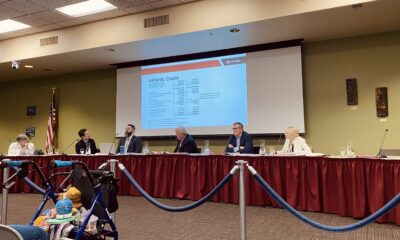Campus Life
A Dynamic Process: Why people don’t know about the accreditation crisis
The accreditation crisis currently facing NIC is characterized by legal terminology, inflammatory quotes, and uneasy tension. It’s quite daunting for those uninformed to try to understand such a complicated issue. Where does one even start? If one navigates to NIC’s Key Points web page, they will be greeted with the following statement:
“NIC is going through an evolving process with our accrediting body, the Northwest Commission on Colleges and Universities (NWCCU).”
NIC’s Key Points web page
Perhaps there’s no better way to say it than that. This phrase has been used in different NIC communications since February of 2023. Students may have received a text message last summer with this phrasing, albeit with the word “evolving” substituted for “dynamic”.
Gerry McCray, NIC’s Communications Coordinator, said this statement was originally the lead sentence for NIC’s Key Points campaign, which serves as a “public facing hub for updates on the college’s accreditation status.”
“The wording was chosen as “dynamic” or “evolving” because the information provided by NIC on its website is subject to change due to a new action by any party, the availability of new information, and changes in requirements and/or status,” said McCray
Continuing down the page, visitors will find updates on accreditation at NIC and records of letters between the college and NWCCU. It is through these letters that NIC is notified of changes to their accreditation status or given explanation for how the college can fix problematic issues.
With this thorough source of information accessible to anyone with an internet connection, it seems reasonable that most people would have all their accreditation questions answered.
Let’s see what students have to say.

Other students asked what NIC’s current status is, and if moving athletic conferences affects it. One student remarked “All I know is we might lose our accreditation and I think we should know [more] for our future purposes.”
“My first class I asked my advisor about it and she had no deep answers about it,” Hinojos said.
Students regularly interact with NIC Faculty and Staff, who could be primary sources of accreditation information. It’s a reasonable assumption that college employees would be more informed on this issue than students are. A few employees gave a different narrative.
“Most people don’t even think about it,” said John Jensen, Assistant Professor of Philosophy. “It’s not on their radar.”
“I know they’ve had violations,” said Mike James, an NIC security officer. “As long as they’re trying I think that’s all they’re looking for.”
“People have kind of lost track,” said Matthew Nolan, Chairman of the College Senate.
So what gives? Why is there such a disconnect between publicized information and the awareness level of those on campus? Shouldn’t an issue with such terrible consequences be critically important to both students and employees of the college? There’s a few reasons why this is the case.
Accreditation information is confusing to read
Reading the letters available on the Key Points page is undoubtedly a burdensome task that takes a significant amount of time. These official correspondences use technical and professional terminology that is illegible for many regular people. The following excerpt from NWCCU’s most recent letter illustrates this well.
Recommendation 6, Spring 2023: Through its governance system, North Idaho College should work to achieve consensus between the Board and college leadership to identify internal and external strategic initiatives and to jointly create and execute plans to address them. (Standard 1.B.4)
To decipher this passage, readers first have to identify what a recommendation is, why they’re important, and what Standard 1.B.4 is referring to. Regardless of the vague terminology, these letters are difficult to understand because of their structure. It’s certainly no quick and easy task.
“They send out these updates that have a bunch of words that typical college kids don’t really know,” said Kennah Hewitt, RA. “That’s why most of us don’t say anything because we don’t know how to help or what to say.”
Moreover, understanding one letter requires being up to date on other information. One must read other letters, consult the NWCCU glossary, and understand the Standards of Accreditation and Eligibility Requirements. All this supplementary work is necessary for a comprehensive understanding of the current issue.
With so many different factors at play, it’s plain to see how NIC is undergoing a dynamic process.
Tom Greene, Interim Chief Communications and Government Relations Officer, oversees much of the information that is communicated to the public. He admitted the information is difficult to understand, however “it’s as easy to read as we can put it out there.”
“The information’s there, it’s just a very overwhelmingly complicated issue,” Greene said.

Community members have a lot of misconceptions
Given how complicated the issue of accreditation is, it’s inevitable that people will have misconceptions and misinterpretations. Students who only hear pieces of information from teachers or news releases are left in the dark about a lot of information.
It seems the most common misconception is that students will lose their course credit and have to retake their classes at another school. Fortunately, all credits and degrees previously obtained from NIC will remain valid regardless of accreditation status.
“There’s a ton of misinformation out there and it’s hard to dispel that,” Greene said. “One of our biggest challenges is students not wanting to enroll in NIC because they might believe that their credits won’t transfer … any credits that a student is taking will remain valid even in every scenario.”
Another misconception that community members have is that losing accreditation is no longer a threat to the college. After several months without major changes or shocking headlines, people seemed to have let the issue slip their mind. The attitudes of several students on campus seem to reflect this perspective.
Kennah Hewitt comes in contact with many students as an RA in NIC’s Residence Hall. Her analysis of Freshmen students is that they’re uninformed on accreditation “because they weren’t really here last year when it was happening.”
“When everything was going on last year, no one knew what was going on even though there were articles being posted,” Hewitt said. “It didn’t make sense to the students.”
Jayden Yoast, another RA, echoed these sentiments by observing how conversations around the hall this year have been different compared to last year.
“This year, I haven’t heard anybody talk about it,” Yoast said. “Last year everybody was talking about it.”

In his own analysis of the campus culture, ASNIC Vice President Tom Hersey said “A year ago… it was a lot more stressed” whereas now it’s evened out.
The time period these quotes are referring to is December 2022 until July of 2023. During this time, NIC President Nick Swayne was placed on administrative leave and NIC was issued a sanction of Show Cause from the NWCCU. Both Swayne’s leave and his ensuing lawsuits grabbed headlines in local publications like the Sentinel and the CDA Press.
The most recent action from the NWCCU was July 7, 2022, when they extended the Show Cause sanction for another year. Since this time, NIC has received letters regarding its progress on regaining good standing, the NWCCU visited the campus, and accreditation has continued to be discussed at the monthly Board of Trustees meetings.
These less sensational updates have apparently not been gripping to many students on campus. Despite the lack of major updates, NIC still remains under the Show Cause sanction and currently can have its accreditation revoked at any time.
Most people feel they can’t help
A common attitude held by those on campus is that they cannot affect the outcome of the issue. Not only is the issue too complicated for many to get involved, but it also seems outside of their control. In the recent NWCCU Peer Evaluation Report, they praised the “dedication and resilience of NIC’s administration, faculty, staff, and students.”
The letter goes on to identify their chief concern is the Board of Trustees’ lack of progress on issues under their control. These issues include “a functioning governing board”, “an effective governance structure”, and employing a single CEO (it’s worth noting that since this letter, the Board has taken steps to identify a single CEO.)
While other groups may be relieved of fault, they still feel powerless to help the situation. Vicki Isakson, Dean of Instruction, said “the last letter that came from the NWCCU was pretty clear where and how the issues could be fixed and that was with the board.”
“The longer that it goes on the more that we have had to continue on with business as normal and focus on what we have control over” Isakson said.
Isakson works closely with Tom Greene as they’re both members of the President’s Cabinet. Greene holds a similar view.
“At a certain point you just gotta realize that you gotta do the best you can at your job,” Greene said. “But if things are out of your control you can’t get too wrapped up with that.”
Back in the Residence Hall, RAs Jayden Yoast and Kennah Hewitt confirmed that students don’t get involved because they fail to see how they could improve matters.
“I don’t really read into it cause I can’t really fix any of it anyway,” Yoast said.
“A lot of the students think that it’s not worth trying because at the end of the day the board’s gonna do what they want to do,” Hewitt said.
Meanwhile, up at the Parker Technical Education Center, NIC’s campus for career and technical education programs, students feel a similar way. After looking into it once, welding student Gavin Brown concluded that “it seemed like a losing battle.”
Brown’s welding professor, Tim Straw, said that accreditation doesn’t affect their class time, even though it seems like “the sky is falling” on main campus.
“I don’t think I’ve had any of my students ask me about it,” Straw said. “We don’t talk about accreditation in class… it does not affect our day to day operations whatsoever.”

Straw’s view likely stems from the fact that his students receive industry certifications at the end of their programs, as opposed to college credit. Both the Parker campus and NIC’s Workforce Education Center house programs that are independent from NIC’s accreditation status.
During her time as Director of the Workforce Education Center, Vicki Isakson noted that there were “just a handful” of concerns about accreditation and other than that, “it’s been pretty quiet.”
“Those programs are non credit and they don’t fall under the same accreditation standards as all the other programs that NIC offers,” Isakson said. “As long as we have the facilities to provide the training, the training would go on even if the accreditation was pulled”
However, it’s difficult to say whether the facilities will still be available without accreditation, which allows the college to be funded by state taxes. Furthermore some technical certificates require students to complete academic courses relating to math and sciences. These would not be available at NIC without accreditation.
People are tired of talking about it
NIC was put under Warning status on April 1 of 2022. Since then, NIC has seen numerous letters documenting dysfunction, explosive board meetings, and startling headlines. The emotional toll of being invested in the issue for years is too much for many people, leading them to check out.

ASNIC represents NIC students in matters relating to school governance. Vice President Tom Hersey and senator Presley Steele shared similar sentiments after being involved for the past few semesters.
“I think people are burned out about it,” Hersey said.
“Everyone’s sick of it and burned out,” Steele said.
“The whole thing is just kind of a circus,” said Damian Maxwell, former ASNIC President. “I think everyone’s just sick of it.”
It’s difficult to care about accreditation
Maxwell, who is a current student living in the Residence Hall, observed how apathetic many students are to the college potentially closing. One student reportedly declined to discuss the issue with him, saying “I ain’t gonna be here in six months.”
“The second I told them that their credits are fine, they’re like ‘oh okay not my problem,” Maxwell said. “There are some things bigger than you.”
Students have much to worry about at this point in their lives. Beyond achieving their degrees, they have other responsibilities and goals that require their investment. It’s difficult for students to care about an issue that requires so much research and emotional stamina.
Even though this “evolving process” seems esoteric and inaccessible to many people, losing accreditation has tangible impacts. It’s still unclear if another institution would purchase the campus or if the land would be repurposed.

“[NIC is] a huge part of our community,” Greene said. “ It drives the workforce, it gives students and community members a chance to change their lives, better their lives. It means a lot to a lot of people and to have this threat is not easy.”
Losing NIC as a resource for attaining a college degree would derail many community members’ goals for education. The nearest community colleges are in Washington, with the nearest Idahoan public college being a seven hour drive south. Those who care about this community would do well not to neglect NIC’s struggle.
For more information or to stay up to date on NIC’s accreditation, visit the Sentinel.
This article was amended on February 28. The changes include:
- Corrected a typo in the paragraph beginning with “The most recent action from the NWCCU…”
- Corrected a misspelling of Presley Steele’s name.
- Corrected uses of “kind’ve” to “kind of”.


















